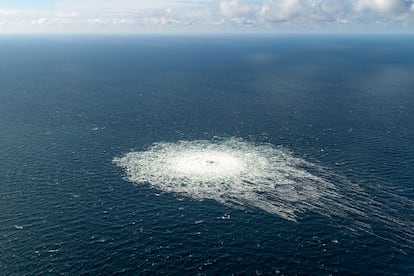Sweden confirms ‘blatant sabotage’ of Nord Stream gas pipeline caused leaks
The German, Swedish and Danish authorities cooperated on the investigation into September’s damage to the infrastructure and concluded explosives were involved

The Swedish authorities have confirmed that investigations into leaks detected in September in the Nord Stream gas pipeline in the Baltic Sea have uncovered “traces of explosives,” confirming the hypothesis that the pipeline had been subjected to “blatant sabotage.” Mats Ljungqvist, the Swedish public prosecutor heading up the inquiry, said in a statement released by his office that: “Analyses that have now been carried out show traces of explosives on several of the foreign objects that were found. Advanced analytical work is still being carried out in order to reach more definitive conclusions about the incident.”
The Swedish and Danish governments reported on September 27 that the Nord Stream 1 and Nord Stream 2 pipelines, which carry natural gas from northwestern Russia to Germany, had suffered damage and were leaking into their territorial waters. A day earlier, seismographs on the Danish island of Bornholm detected two explosions in the same area. At the time, both Nord Stream 1 and Nord Stream were offline, although both still contained gas maintained at a constant pressure.
Nord Stream 1 has not been carrying gas since the end of August, when Russia reported an oil leak at the only compressor station that was still in operation. Nord Stream 2 had started operating after Germany suspended its certification in February, days before Moscow launched its invasion of Ukraine in response to Russian President Vladimir Putin’s recognition of the independence of pro-Russian separatist regions.
“Cooperation with the authorities in Sweden and other countries has worked excellently. In view of continuing work within the framework of the preliminary investigation and ongoing cooperation, it is important that we are able to work in peace and quiet,” Ljungqvist said.
The Swedish Security Service reported on October 6 that the investigations had determined that the damage caused to the pipelines had been caused by “explosions,” and that this “strengthens suspicions of a serious act of sabotage.” The counter-terrorism agency added that the probe into the incident would determine if any specific individuals were to be blamed.
The company responsible for operating the pipelines, Nord Stream AG, said after the leaks were detected last September together with a loss of pressure in Nord Stream 1 that the damage suffered by the installations was “without precedent.” The authorities in Germany, Denmark and Sweden have excluded Russia from the probe into what occurred, which has led to a formal protest from Moscow, which has stated it will not recognize the findings of any report on which it has not participated.
Sweden, Denmark, the rest of the European Union and the United States, as well as Russia, have all pointed to sabotage, although they differ as to the possible source. Moscow has accused “Anglo-Saxon” countries of being behind it, noting Washington’s long-standing opposition to the Nord Stream project.
Sign up for our weekly newsletter to get more English-language news coverage from EL PAÍS USA Edition
Tu suscripción se está usando en otro dispositivo
¿Quieres añadir otro usuario a tu suscripción?
Si continúas leyendo en este dispositivo, no se podrá leer en el otro.
FlechaTu suscripción se está usando en otro dispositivo y solo puedes acceder a EL PAÍS desde un dispositivo a la vez.
Si quieres compartir tu cuenta, cambia tu suscripción a la modalidad Premium, así podrás añadir otro usuario. Cada uno accederá con su propia cuenta de email, lo que os permitirá personalizar vuestra experiencia en EL PAÍS.
¿Tienes una suscripción de empresa? Accede aquí para contratar más cuentas.
En el caso de no saber quién está usando tu cuenta, te recomendamos cambiar tu contraseña aquí.
Si decides continuar compartiendo tu cuenta, este mensaje se mostrará en tu dispositivo y en el de la otra persona que está usando tu cuenta de forma indefinida, afectando a tu experiencia de lectura. Puedes consultar aquí los términos y condiciones de la suscripción digital.








































